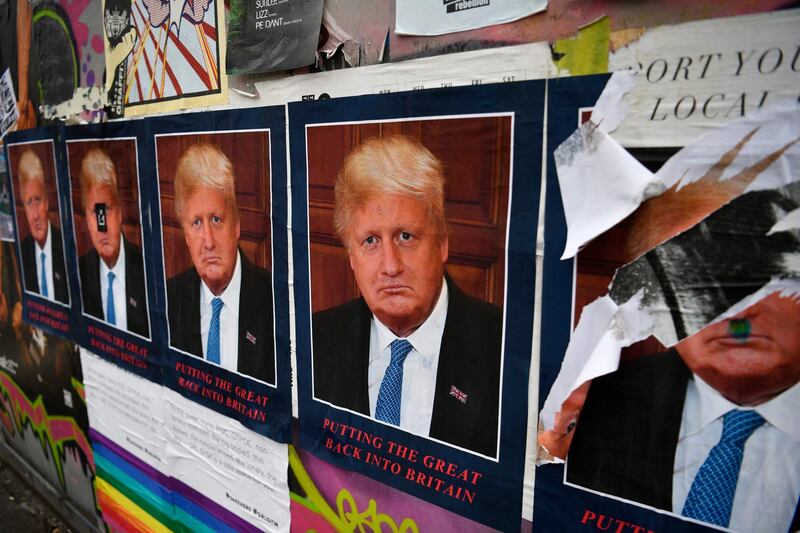Of all Winston Churchill’s maxims on leadership, the one that resonates most today is brief and to the point. “Action this day!” was an epigraph on a stamp that the wartime leader used on official documents.
It is an urgent call to action, and one that is mirrored in the tendency of US President Donald Trump and British Prime Minister Boris Johnson to issue directives on the spot.
The controversies that surround Mr Trump and Mr Johnson have been well-aired but their popularity is rooted in an ability to cut through complex situations.
From the outset of his time in 10 Downing St, Mr Johnson has appeared determined to keep it simple, just as Churchill did.
In less than a fortnight, Mr Johnson has already triggered a sell-off in sterling, with market traders on standby for a full-blown currency crisis.
Analysts at RBC Capital Markets assess there is a 60 per cent risk of an autumn general election, with Mr Johnson failing to get his preferred no-deal Brexit through parliament. Since most of the electorate is split between Conservative and Labour, according to recent polls, with the Liberal Democrats and Brexit Party trailing in third and fourth place, that would mean a high risk of Jeremy Corbyn, the Marxist-leaning opposition leader, gaining power.
Even if a no-deal Brexit takes place, the Bank of England has warned of the economy facing a rare supply-side shock — that is, with imports blocked — coinciding with a downturn in demand.
In either case the already weakened pound could plunge past parity with the euro and test the historic low of $1.05.
Yet Mr Johnson has set course with Trump-like certainty. Indeed, he was quoted last year advocating the idea of Mr Trump overseeing Brexit. “He’d go in bloody hard,” he told a group of donors in a leaked recording. “There’d be all sorts of breakdowns, all sorts of chaos. Everyone would think he’d gone mad. But actually you might get somewhere.”
Headlines that accompanied Mr Johnson's rise to power were either alarmist or bullish. Mr Johnson's own version of Make America Great Again is the credo of economic "boosterism". Sky News political pundit Adam Boulton summed up the outlook for the weeks ahead in his Sunday Times column as "hoping for Dr Jekyll, braced for Mr Hyde".
What drives the politics of Mr Trump and Mr Johnson is the need to overcome resistance to their proposals.
When the US president heard from his negotiating team on Thursday that China was dragging its feet at trade talks in Shanghai, there was an immediate barrage of tweets raising the ante in the trade war.
The full gamut of tariffs is now set to come into force in September and Mr Trump has once again upended the chances of thrashing out a compromise at the negotiating table.
Similar, too, is Mr Johnson's demand that a deal to leave the EU must omit the "undemocratic Irish backstop" that has plagued efforts to pass the withdrawal agreement drawn up his predecessor Theresa May late last year.
The new British prime minister is refusing to travel to European states, knowing that he faces a certain rebuff. A more conventional leader would have embarked on a whirlwind tour of the neighbours to show a willingness to talk, with less than 90 days until the departure date.
On high strategy or low tactics, the methods Mr Johnson and Mr Trump employ look likely to run on parallel tracks for some time. This might aid their common desire to seal a trade deal between the two countries. When they talked last week, they held common views on security and 5G. At least, that’s what we understand from the White House. In a Trump-like move, Mr Johnson’s office refused to publish a read-out of the call.
Hardball politics does work. The US Congress might be wrangling still over a possible impeachment of the American leader but it reached a budget deal with Mr Trump last week. The two-year deal takes the threat of another government shutdown out of the picture until the next presidential election.
The crossover between political gridlock and economic statis is the common purpose the two leaders are happily exploiting. Congress and the British parliament have been so mired by intractable political wrangling that many in the public welcome tough talk at the top.
Both men can court economic disaster and spurn the warnings of the establishment because there is so much disillusionment with the current situation.
Nearly 12 years since the financial crisis that struck the US and Europe, a new economic model is an appealing prospect. While assets have inflated, interest rates are stagnating in most countries. In some places, notably Switzerland, the rates are negative. Bond-holders pay the Swiss to borrow their money.
This doesn’t make sense and is intolerable, which is why Mr Johnson and Mr Trump are tearing up the playbook.





